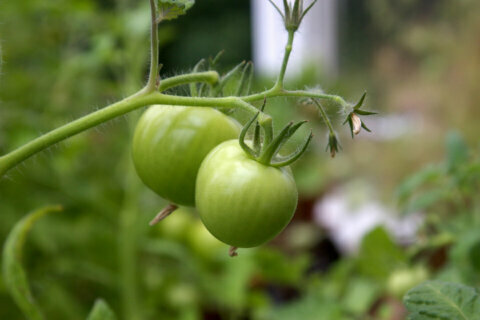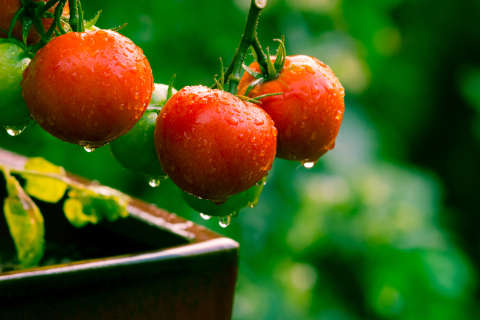Meet Mike at Greenstreet this weekend
Mike will appear at Greenstreet Gardens in Lothian, Maryland, at 1:30 p.m. on Saturday, April 25, and at their Old Town Alexandria location (Braddock Road) on Sunday, April 26, at 11 a.m. and 1 p.m.
Don’t feed the ticks
Last Thursday, an Associated Press report warned that the severe winter weather we just experienced will lead to an upsurge in the number of ticks trying to attach their nasty selves to us.
And those nasty ticks are already active, so it’s time for us to be proactive. Always check for ticks after you’ve walked through brushy areas or trees with low-hanging branches. And check carefully — ticks are very small at this time of year — often only the size of a poppy seed — and easy to miss.
Be especially suspicious of a red or itchy area on your body with anything small and black at the center; have someone examine the area with a magnifying glass and remove the tick carefully if that’s what it is. These tiny ticks are a big threat, but if they’re removed within the first few hours after they attach, they won’t be able to transmit any disease organisms. Which means time is of the essence.
Use mice to kill your ticks
That Associated Press report quoted New York entomologist Rick Ostfeld, who stressed that so-called deer ticks actually pick up Lyme disease when they feed on field mice, not deer.
As we have stressed for many years, deer ticks may never even see a deer — but they all have to feed on mice as part of their life cycle. That’s why I just spread my annual batch of Tick Tubes around the outskirts of my property.
Tick Tubes are cardboard cylinders filled with cotton balls treated with permethrin, a pesticide deadly to ticks. It’s a synthetic form of the botanical pesticide pyrethrum, derived from crushed chrysanthemum flowers. Mice take the cotton back to their nests to use as bedding, and the permethrin kills all the ticks who come in on the mice, stopping the problem at its source. It’s a great common-sense answer to a serious problem.
P.S.: Toxic lawn sprays are not sensible. Ticks lurk in damp areas filled with trees and tall brushy plants. Spraying your lawn just makes your lawn toxic to you and your family. And pets. And wildlife. And our water supplies. And … the list goes on.
“Great big gobs of greasy grimy gruesome grubs …”
Andrea in Olney writes: “I’m preparing my beds for spring planting, and at around 6 to 8 inches deep I found shrimp-like creatures with orange heads, six legs, a white body and a gray hind section. Are they grubs? I just built this bed last year, filling it with what I thought was organic soil. Was that the problem? And how do I prevent this from happening again?”
Well, first, you shouldn’t be tilling or turning the soil in a raised bed, Andrea. Once filled, you’re not supposed to disturb the soil in a raised bed — just install your plants and add two inches of compost to the top every season.
Anyway, they are grubs, and they arrived not with the soil but via the eggs of late year’s June, Japanese, Asiatic and other scarab-family beetles. Applying beneficial nematodes to the soil will destroy the grubs and keep your plot organic. See last week’s Plot for details.
Woodchucks must be sent to Woodstock
Latonia in Waldorf writes: “A groundhog (maybe more than one) has dug a hole underneath my driveway; how can I get rid of them?”
Groundhogs are very serious pests, Latonia. Their powerful arms and fierce claws make them a real danger to dogs and children, especially when they’re cornered. And they’re just as big a threat to the foundations of homes and outdoor structures.
Some people report success by repeatedly emptying trays of well-used kitty litter into the holes. The groundhogs get sick of the smell and move on. If you try this, be sure to wear gloves and remove and dispose of the feces first — just pour in the extremely aromatic wet litter.
If that doesn’t work, hire a professional service to trap and dispose of the animals — before they destroy more than just your driveway.
Compost mulch is the best mulch
Steve and Marina in Calvert County write: “We currently use LeafGro as our landscaping mulch as you have recommended. The only problem is that it doesn’t keep weeds from growing like a heavy layer of wood mulch does. Most landscapers recommend wood mulch, but we have a lot of trees, and it’s much easier to get the leaves blown or raked off of the LeafGro at the end of the season than with wood mulch, so we don’t want to change. Should we just apply more?”
Yes; it sounds like you might be spreading it too thin. In studies conducted at three different universities, two inches of black yard waste compost (such as Maryland’s LeafGro product) controlled weeds just as well as two inches of dyed black wood mulch — without the plant and building damage caused by the wood and the nuisance molds it breeds.







